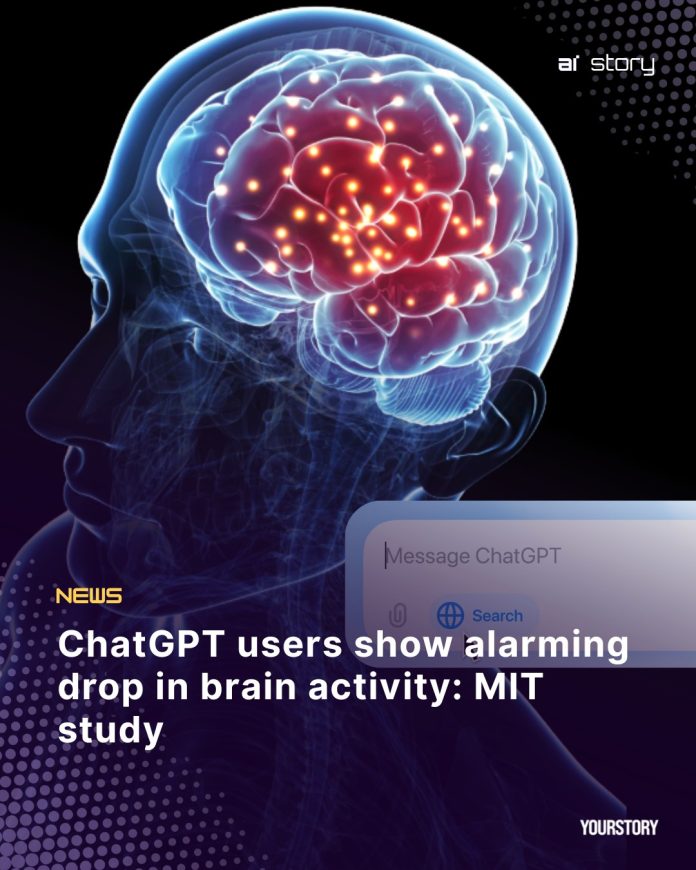A recent intriguing study from MIT explored how frequent reliance on generative AI tools like ChatGPT can subtly change the way your brain works—especially when it comes to creativity, memory, and deep engagement. Researchers tracked 54 participants over several months as they wrote a series of essays under different conditions—some relying entirely on their own minds, some using a search engine, and others using ChatGPT. The findings revealed a clear pattern: the more people depended on AI for writing, the less their brains stayed actively involved.
Participants were divided into three experimental groups:
- Brain-only – wrote essays using only their own memory and cognition.
- Search engine – used a conventional search tool to gather facts or prompts.
- ChatGPT (AI tool) – used a large language model to help craft essays.

These sessions unfolded across multiple weeks. Some students wrote all their essays using one tool, while others later switched—such as going from ChatGPT to working unaided or vice versa.
Using EEG scans to monitor brain activity, researchers observed striking differences:
- Brain-only writers consistently showed strong, well-connected brain activity, especially across regions tied to memory retrieval, creativity, and planning.
- Search engine users displayed moderate engagement—more than AI users, but less intense than the brain-only group.
- ChatGPT users had the lowest levels of neural connectivity. Their brains showed significantly reduced signals in areas responsible for memory and executive function.
This wasn’t a one-off finding. As AI usage continued over the study period, brain activity further dropped. Even after pausing ChatGPT, users didn’t quickly recover full neural engagement.
Beyond EEG data, behavioral patterns further supported the findings:
- Essays from the brain-only group were notably more original, with unique ideas and richer expression.
- Participants using AI produced more formulaic essays, with repetitive structures and fewer unique viewpoints.
- When asked to recall or quote their own work, ChatGPT users struggled significantly—they often couldn’t accurately remember what they had just written, even moments later.
- Users using only their own brains reported stronger feelings of pride and ownership over their words, a sense that was noticeably diminished among those leaning on AI.
An experiment in switching methods offered telling insights:
- Those who started writing with their own minds and then used AI performed better than those who began with AI then switched to brain-only work.
- In fact, participants who first wrote without AI and then revised with AI demonstrated healthy brain activation even during the AI stage, suggesting that initial mental effort helped maintain engagement.
- In contrast, the reverse—beginning with AI—led to lower neural activity later and poorer recall.
This sequence effect suggests that starting with your own effort helps “prime” your brain. Jumping directly into AI may incur what researchers call a type of “cognitive debt.”
“Cognitive debt” reflects the idea that offloading thinking to a tool like ChatGPT can come at a cost. Brains that aren’t engaged early tend to form weaker memory traces, reduced creative storytelling, and diminished attention to detail. Over time, this “debt” can accumulate—potentially making it hard to fully recover mental sharpness, even when the AI is no longer used.
The study raises several important points for learning, writing, and professional work:
- AI isn’t inherently bad, but it works best when used as a supplement—not a substitute.
- Starting with your own draft and ideas preserves brain engagement.
- Balance is key. A hybrid model—first brainstorm and organize, then refine using AI—appears to support both efficiency and cognitive development.
- Creative and deep learning tasks especially may suffer with heavy AI use. When the goal is to develop ideas or learn deeply, solo thinking builds stronger mental connections.
Feelings of authorship matter. People who draft with their own mind feel more responsible and satisfied with their work—a psychological benefit AI can undercut.
While the study involved a relatively small group of students over a limited period, its findings serve as a cautionary flag. AI tools like ChatGPT offer undeniably powerful help—but they are most effective when wielded thoughtfully. Leaning too heavily on them can shave off opportunities for the brain to stretch, grow, and remember.

If you want to harness AI without dulling your mental edge, here are some best practices:
- Write an initial draft yourself: Grab a pen or jump straight into your own outline before calling on AI.
- Use AI for polishing: Let ChatGPT help with clarity, grammar, or expansion—avoid starting from scratch with it.
- Ask it to challenge your ideas: “What counterarguments might exist?” Use AI to provoke thought, not to produce full answers.
- Reflect afterward: Test yourself—summarize what you learned or recall key wording without looking. Reinforce memory.
- Teach someone what you wrote: Explaining your own words solidifies learning better than letting AI do the work.
What this MIT project shows is not that AI makes us stupid—but that it can make us lazy if used unthinkingly. Our brains thrive on challenge, creativity, and effort. When we outsource too much thinking, we risk atrophying our own mental muscles.
That said, AI can serve as an incredibly useful assistant—when used strategically. By combining initial human thinking with AI support, we can enjoy both efficiency and cognitive engagement. In the end, it’s not about rejecting new tools—it’s about using them wisely so they amplify, rather than replace, our own thinking.

















